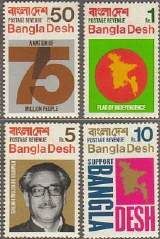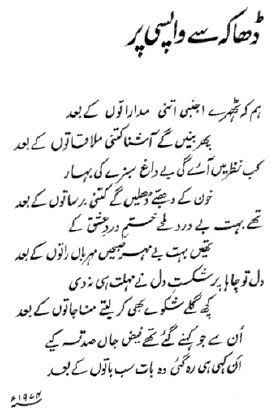Adil Najam
 As the fourth part of our series on the events of 1971, we are reposting this post which was first published at ATP on December 16, 2006. We are reposting it with all the original comments since they, as a whole, are very much part of the conversation we all need to have with ourselves. The previous three parts of the series can be read here, here and here.
As the fourth part of our series on the events of 1971, we are reposting this post which was first published at ATP on December 16, 2006. We are reposting it with all the original comments since they, as a whole, are very much part of the conversation we all need to have with ourselves. The previous three parts of the series can be read here, here and here.
Today is December 16.
Today Bangladesh will mark its 35th ‘Victory Day.’
 Most Pakistanis will go about their lives, not remembering or not wanting to remember. We should remember – and learn – from the significance of this date.
Most Pakistanis will go about their lives, not remembering or not wanting to remember. We should remember – and learn – from the significance of this date.
Not because it marks a ‘defeat’ but because it marks the end of a dream, 24 years of mistakes, horrible bloodshed, traumatic agony, and shameful atrocities. The constructed mythologies of what happened, why, and who is to be blamed need to be questioned. Tough questions have to be asked. And unpleasant answers have to be braced for. We need to honestly confront our own history, for our own sake.
But right now, the goal of this post is different. We at ATP just wish to extend a hand of friendship to our Bangladeshi friends. May the memories we make in our future be very different (and more pleasant) than the scars we carry from our past.
There is much – too much – that I wish to say; but cannot find words for. So let me do what I always do when I am at a loss of words. Let me quote Faiz Ahmad Faiz, who in his memorable 1974 poem ‘Dhaka say wapsi par’ (On Return from Dhaka) expressed what I wish to say so much better than I ever could.
We share with you here the original poem in Urdu, a version in ‘Roman Urdu,’ a wonderful English translation of the poem by the late Agha Shahid Ali in his book The Rebel’s Silhouette, and a video of Nayarra Noor singing the verses with the passion and feeling that they deserve.
ham ke Thehre ajnabi itni mulaaqaatoN ke baad
phir baneiN ge aashna kitni madaaraatoN ke baadkab nazar meiN aaye gi be daaGh sabze ki bahaar
khoon ke dhabe dhuleiN ge kitni barsaatoN ke baadthe bahut bedard lamhe khat’m-e-dard-e-ishq ke
theiN bahut bemeh’r subheiN meh’rbaaN raatoN ke baaddil to chaaha par shikast-e-dil ne moh’lat hi na di
kuchh gile shikwe bhi kar lete manaajaatoN ke baadun se jo kehne gaye the “Faiz” jaaN sadqe kiye
an kahi hi reh gayi woh baat sab baatoN ke baad
Agha Shahid Ali’s Translation:
After those many encounters, that easy intimacy,
. we are strangers now —
After how many meetings will we be that close again?When will we again see a spring of unstained green?
After how many monsoons will the blood be washed
. from the branches?So relentless was the end of love, so heartless —
After the nights of tenderness, the dawns were pitiless,
. so pitiless.And so crushed was the heart that though it wished
. it found no chance —
after the entreaties, after the despair — for us to
. quarrel once again as old friends.Faiz, what you’d gone to say, ready to offer everything,
. even your life —
those healing words remained unspoken after all else had
. been said.




















































Set it down to thyself as well to create
good precedents as to follow them
Our Heros
Hero/Heroine: n. a man or woman of exceptional quality who wins admiration by noble deeds, esp. deeds of courage;
In the story of the Stranded Pakistanis which has now spanned over 3 decades and has been source of excruciating pain and suffering to tens of thousands of innocent human beings, there is no shortage of heroes. Every one of the victims who bore extreme adversity and injustice with incredible fortitude and without any malice towards the perpetrators is to us a Hero.
Although the saga of Stranded Pakistanis has not yet been concluded with justice for the oppressed, there have been plenty of men and women whose actions have been guided by their conscience and compassion. Our heroes come from many lands, speak different languages and profess different faiths. We honor them all for assisting the oppressed in one manner or extent or another.
It is within every one of you to be a hero should you so decide. You and we shall pass through this world but once, do not hesitate for a moment to perform acts of kindness that are within your grasp. Our heroes have blazed a trail for us to follow. We salute them, humanity salutes them.
MUSLIM BIHARI AND PAKISTAN
Speaking at camp housing Moslem refugees from communal disorders in Bihar the Quaid-e-Azam Mohammad Ali Jinnah said:
“The sufferings Moslems underwent in Bihar and elsewhere clearly showed we should have the separate state of Pakistan. I am really proud of the Bihar Moslems who sacrificed so much. Their sacrifices will not go in vain. They have brought the Pakistan goal nearer and have shown readiness to make any sacrifice for its attainment.”
(Pottstown Mercury, Pottstown, PA. Monday Morning, February 24, 1947)
I would also add that in all such events, common people (civilians) are rarely involved. It’s either the terrorists (like for the Punjab (Khalistan movement) and Kashmir genocides) or the politicians (like for 1984, 92 and 2002).
H. Singh, I completely agree. Indians need to look at themselves – there are plenty of disgruntled communities within India too and plenty of wrongs committed. In addition to the events you mentioned, I would also add the Hindu genocides in Punjab in the 80s, and Hindu Pandit and Sikh genocides in Kashmir in the 90s – no one has been punished for those either.
Real good article . So many comments show how distrubed we all feel what happened to us in Dec 1971.
Islam is a universal religion with very clear message for all human beings how to live peacefuly by accomodating all other communities,religions,cultures. We muslims need to learn all this . What happened in 1971 was all intolerance by one section of muslim society,we ignored another section,s rights and faced the worst in history.Enemies got the opprtunity to break one Muslim state into two. But two nation theory strenghthened further as a Muslim Bengal emerged out of this conflict . Pakista and Bangladesh both Zindabad.